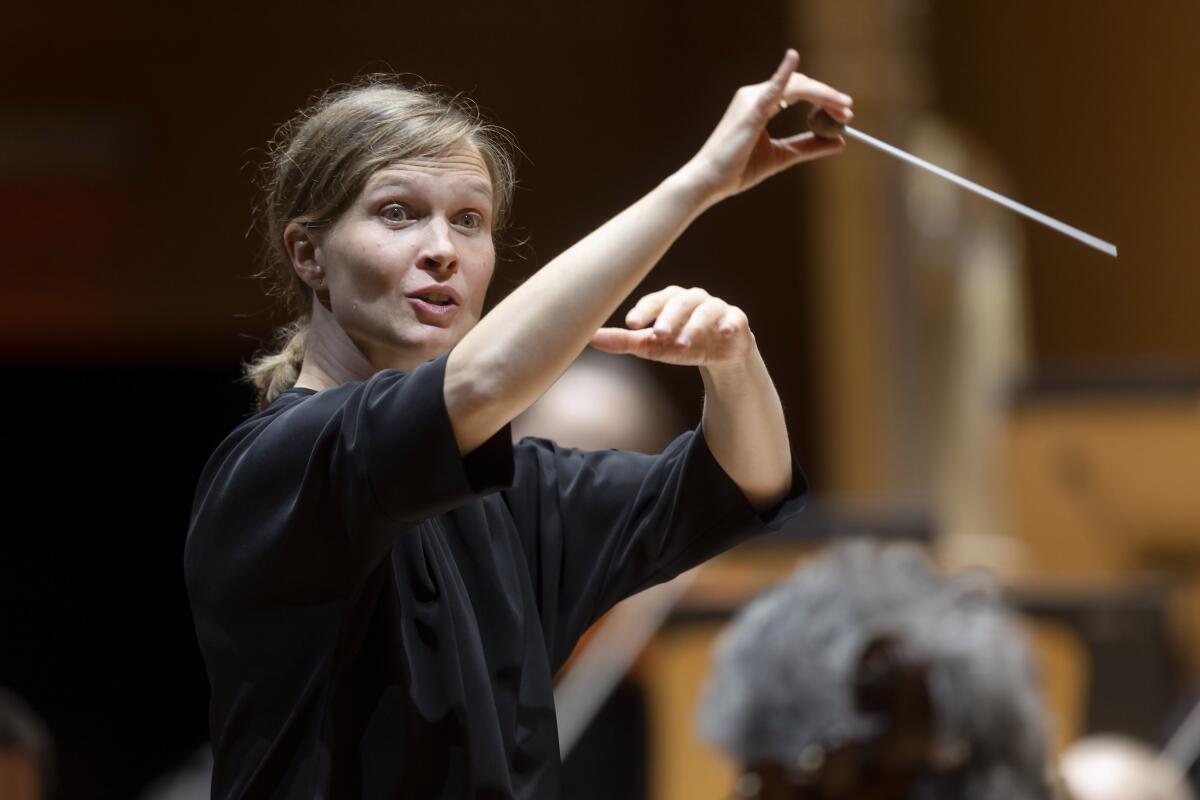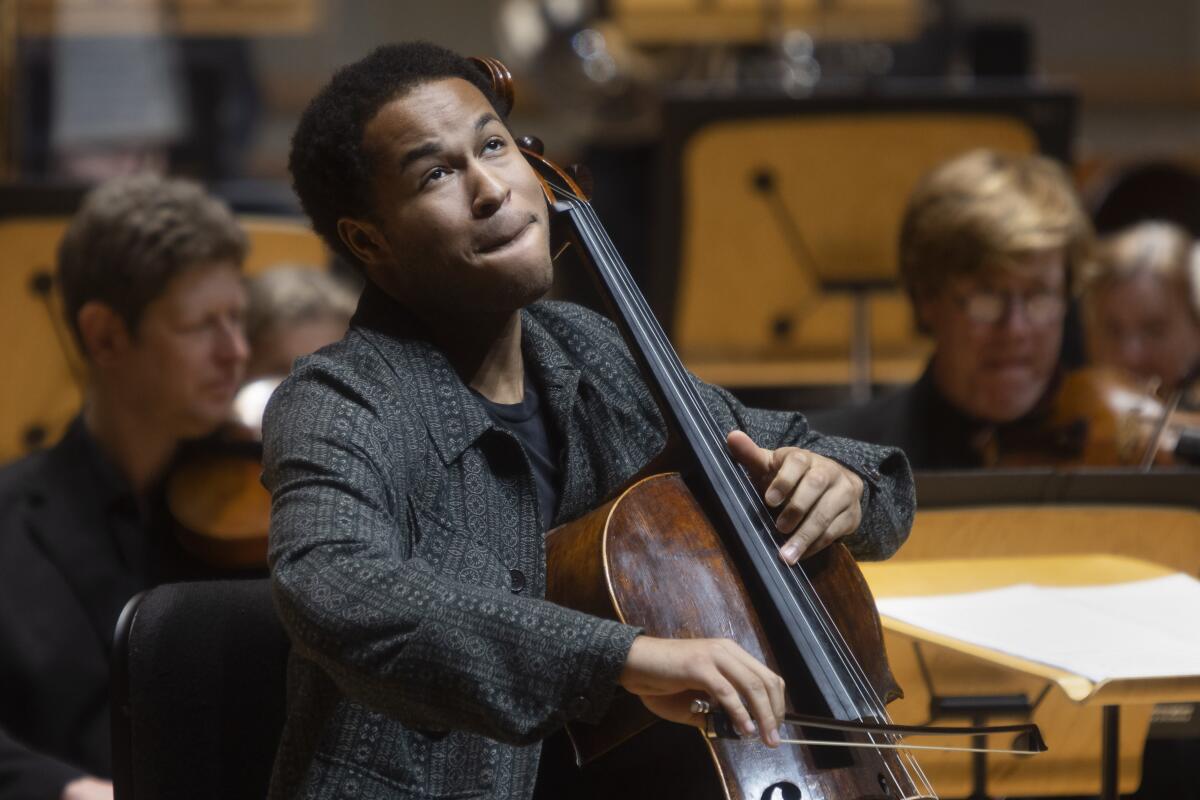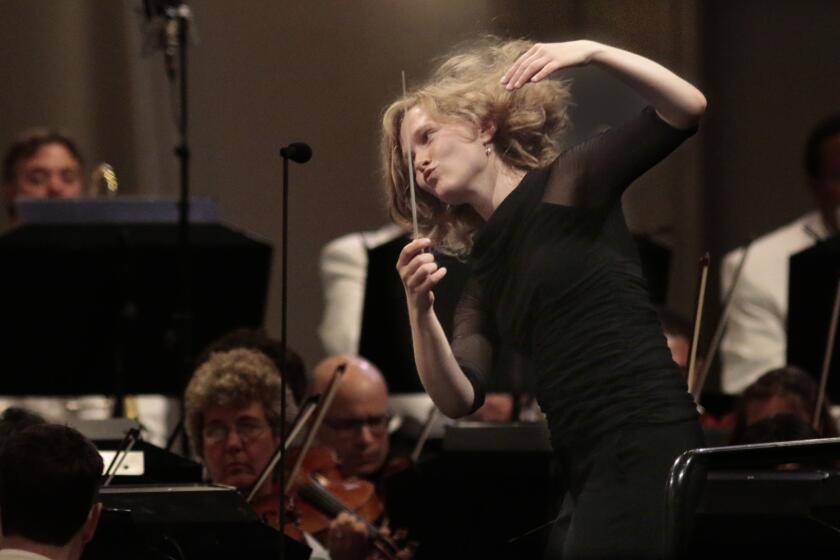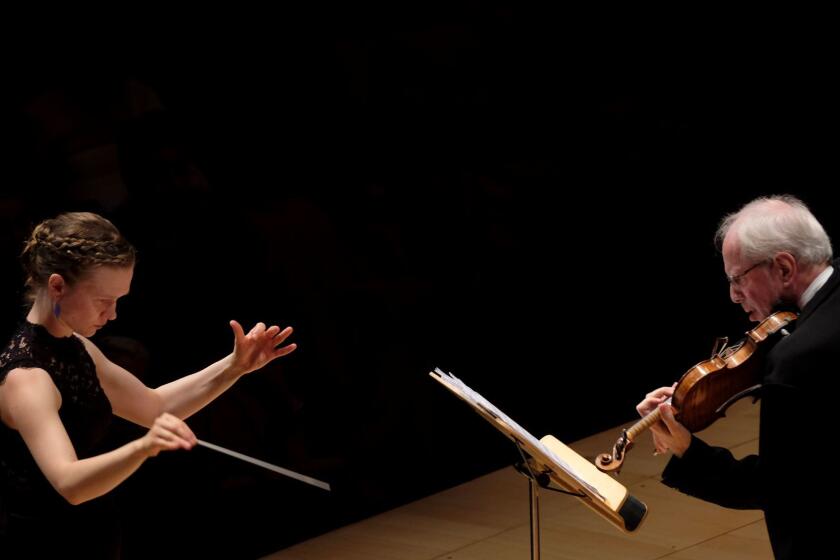Conductor Mirga Gražinyte-Tyla has changed symphonic life. It’s changed her too

- Share via
Mirga Gražinyte-Tyla does the things a conductor is supposed to do. She beats time with expected and needed acuity. She also sculpts time, molding each phrase as though working with molten lead. When she is wild, she is very wild, exciting an orchestra. When she is calm, the music flows as a river does, on its purposeful own, leaving a lingering impression of quiet awe.
She pays the needed attention to instrumental balance. At every instant during her concerts with her robust City of Birmingham Symphony Orchestra at the Renée and Henry Segerstrom Concert Hall in Costa Mesa Tuesday night and at Walt Disney Concert Hall Wednesday night, Gražinyte-Tyla displayed a pressing preoccupation with the texture and power of sound. That could be an exceptional solo clarinet exposing a moment of personal rapture, a heavenly string section filling a concert hall with the cathedral-like awe of communal spirituality. It could also be brass and percussion simply blowing you away.
She’s not the only one who can do this, although she is one of the best in doing it. From the first time we saw her, at her 2014 stellar Hollywood Bowl debut, having just been named assistant conductor of the Los Angeles Philharmonic, she demonstrated a commanding sense of self-assurance, purpose and sheer joy. She was 28. Two years later she became music director of Birmingham’s orchestra, noted for launching the major careers of its three previous music directors — Simon Rattle, Sakari Oramo and Andris Nelsons.
This review has been corrected. Please see below for details.
Birmingham has made her too a star. This is her sixth and last season with the orchestra. She stepped down as music director last year but was made principal guest conductor for 2022-23. She could probably now have any orchestra she wanted. But at the moment she doesn’t want any of them. She comes from a tightly knit musical family in her native Vilnius, the Lithuanian capital. She views the orchestra as a family. She has her own family, her three small children (ages 4, 2 and four months) traveling with her. They will take precedence, and she will for now guest conduct where she wants, performing what she wants.
When it comes to the Birmingham orchestra, the idea of family includes how she considers its players and its traditions, and the way she leads it. There may be no player smaller than she is, but on the podium her arms seem as though they can reach out and touch any musician, no matter how far away. Her gestures are raptly expressive and sweeping, as though she is not so much creating sound but embracing it and those who make it.
This U.S. tour had been scheduled for 2020, as part of the now 102-year-old orchestra’s centennial celebrations, before the pandemic hit. Still, Gražinyte-Tyla honored the roots of one of Britain’s most important ensembles and, with luck on her side, was gifted with another anniversary to commemorate.
At the orchestra’s opening concert in 1920, Edward Elgar conducted his Cello Concerto, which he’d written recently. At Segerstrom, that was performed by Sheku Kanneh-Mason, another young star.
British cellist Sheku Kanneh-Mason, 20, talks about his careful development as an artist, including concert dates in Los Angeles, Berkeley, Boston and New York.
Britain’s other leading composer at the time, Ralph Vaughan Williams, conducted Birmingham as well during its first season. Wednesday happened to be his 150th birthday, and his popular, hymnal “Fantasia on a Theme of Thomas Tallis” was played both at Segerstrom and at Disney, although strangely no mention was made of the occasion.
Both programs ended with Debussy’s “La Mer.” But at Segerstrom, Gražinyte-Tyla included “Jewish Rhapsody” by the Polish composer Mieczyslaw Weinberg. At Disney, she led the West Coast premiere of Thomas Adès’ “The Exterminating Angel Symphony” and Kanneh-Mason played Haydn’s First Cello Concerto.
Taken together, along with a new recording in which Gražinyte-Tyla conducts a pair of Weinberg symphonies and his Flute Concerto, the two concerts in two very different settings provided a vivid sense of what she has accomplished with her first major orchestra of her own.
Segerstrom, which shares acoustics by Russell Johnson with Birmingham’s Symphony Hall, may have offered the closest impression to how the orchestra sounds at home. But Gražinyte-Tyla spent five formative years — between 2012 (when she became a Dudamel Fellow) and 2017 (by which time she had risen to L.A. Phil associate conductor) — in Disney’s more immediate acoustics.

At Segerstrom, Birmingham bloomed, boomed and glowed. The Vaughan-Williams was all grandeur. A mellowness infused Elgar’s autumnal concerto. Kanneh-Mason’s cello had gorgeous richness. Gražinyte-Tyla is one of his earliest champions. They recorded Shostakovich’s First Cello Concerto in Birmingham in 2017, when the cellist was a teenager, for his first bestselling recording.
In Disney, where the connection between players and conductor is more immediate, the livelier Haydn concerto revealed Kanneh-Mason as virtuosically playful. Vaughan Williams’ birthday present was to take his Fantasia out of the church and put it in the concert hall, the magic being in the exquisite sonic details, particularly with offstage strings creating a sense of acoustic mystery.
The core of the two programs went, though, beyond acoustics. Weinberg, who was born in 1919 (the year Elgar’s Cello Concerto was written and the final revision of Vaughan Williams’ Fantasia), emigrated to Soviet Russia when the Nazis invaded Poland in 1939. Although he is far less known than his contemporaries Prokofiev and Shostakovich, he is beginning to be thought their equal, and Gražinyte-Tyla is one of the leaders of his revival.
When Gidon Kremer has a farsighted cause, it is wise to pay close attention.
In a brief conversation with her before the concert, she told me that from the instant she learned of his music from the violinist Gidon Kremer several years ago it spoke to her and has become her passion ever since. The “Jewish Rhapsody,” the second movement of “Festive Scenes for Orchestra,” written at the end of World War II, is a little known work by a composer who wrote 22 symphonies, operas, loads of chamber music, film scores and much else.
This might, thus, seem like a minor 12-minute score. But Gražinyte-Tyla’s performance, from the hugely expressive instrumental solos (particularly the one for clarinet) to the fervent orchestral outbursts, made it monumental. Her new recording with the quirky Eleventh Symphony for harpsichord and strings and the gripping Third Symphony make the case for Weinberg all the more urgent. She said that next she plans to conduct his potent opera about the Holocaust, “The Passenger,” in Madrid in 2024.
As for Adès’ “The Exterminating Angel Symphony,” it contains the most madcap music from his most recent opera, which was based on the Luis Buñuel film. “Berceuse” (the third of the four movements) offers a bit of lovely respite from the entrance music of the opera’s characters, the daffy waltzes and marches, but mainly the score is splendid instrumental slapstick. Gražinyte-Tyla, who premiered the symphony last year in Birmingham, turned it into an exhausting feast of delight.
Thomas Adès and L.A. Philharmonic team for ‘Aspects of Adès’
In her effort to make every orchestral moment matter, Gražinyte-Tyla goes controversially far in “La Mer.” She is never less than elegant in her gestures. In Disney, in particular, one could discern an exacting bringing out of detail and, at the beginning, an airy atmosphere. But she is not one to keep a big orchestra down. Debussy’s sensuous evocations of the play of the waves and the dialogue of the wind and the sea took on an aura of climate change. By the striking final climax, louder than any Debussy I have ever heard, a conductor who is a force of nature met Mother Nature.
But what really separates Gražinyte-Tyla from so many other musicians is her own nature. She puts music and family ahead of career. She said that right now she can devote herself only to one family and still be able to make music her way. At some point, she said with a smile before going off to check on her infant and prepare for the concert, maybe she will have another family — meaning the orchestra.
More to Read
The biggest entertainment stories
Get our big stories about Hollywood, film, television, music, arts, culture and more right in your inbox as soon as they publish.
You may occasionally receive promotional content from the Los Angeles Times.














